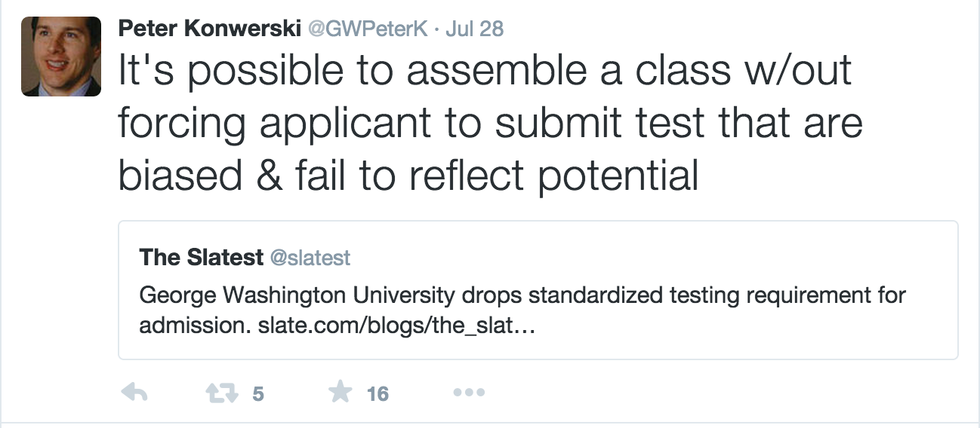Every year millions of teens spend approximately four consecutive hours in a classroom prepared to perform their best as they take what was once considered “the most important tests of one’s high school career," the SAT and ACT. Standardized tests have been criticized for years because many believe they inadequately reflect some applicants' true potential to succeed. Is a four digit number going to really represent a student’s four years of all-nighters, tutorial sessions, research projects, and hard work? Or, are standardized tests just a simple way to gauge how well a student knows basic math, science, reading, and writing objectives?
While these tests are mandatory for most colleges and universities in the admissions process, The George Washington University has adopted a new approach to these often stressful, time-consuming tests and has announced they are now a test-optional university.
Yes, that is right; as of August 1, 2015, incoming applicants will no longer be required to submit their standardized test scores to be considered for admission into this extremely competitive university.
What does this mean for prospective students?
This new policy sounds like a sigh of relief for high school students who hope to be admitted into one of the nation’s leading universities. So your SAT/ACT scores sucked? No problem. You're “not a good test taker”? No worries -- GW admissions will see beyond your score.
Prospective GW applicant Christine Johansen believes,
Not having to submit a test score will increase my likelihood of applying to GW. This will allow colleges to focus more on who a student is and how a student can contribute to their school. In my opinion, more emphasis should be put on how a student performed during his/hers four years of high school rather than on one test he/she took on a Saturday morning.
While this news seems like a breath of fresh air to many, some argue that this new policy devalues GW’s worth.
Former GW student Danya M. Zim argues,
Despite George Washington University's claim, it is virtually impossible for a university to equalize everyone’s application while accounting for the plethora of divergent factors that constitute our high schools...Because it is impractical to account for all these factors, standardized tests were created, designed to ensure that children at various levels meet basic standards in core subjects needed to succeed in life’s endeavors...Without standards, children will graduate high schools with middle school reading levels, college students will struggle to write adequately, and our world ranking in education will drop even lower than it presently is. Standards were created for a reason. Without standards, our doctors would make lethal mistakes, our lawyers would imprison instead of indemnify, and our trust in professionals will erode. So go ahead George Washington, kill the SAT, but understand that you are dumping fuel on an already burning fire disintegrating our nation’s quality of education.
What does this mean to the school?
George Washington University is not the first university to adopt a test-optional policy. However, it is one of the most competitive schools in the country to implement the policy. In GW’s official announcement, the university said the policy can only strengthen the applicant pool; provide an even stronger holistic admission process; and expand opportunity for exceptional, hard-working low-income, minority, and first-generation students.
The university's vice provost and dean of student affairs, Peter Konwerski, even tweeted about the matter.
How does this affect current students?
Although current students were previously required to submit their scores and the new policy will not effect them, many students remain opinionated on the matter.
Current student Katherine Mendoza-Wright (2018) speaks from personal experience and wants others to know that she is not her solely her SAT score. Mendoza notes,
I went to four high schools, and only one pushed me to do well on standardized tests (it was the top public high school in Missouri). In fact, I was required to take two ACT prep classes. At my other schools, all in different states and in lower socioeconomic neighborhoods, there weren't the same kind of resources. Many of my classmates didn't know how to even register for the SAT or ACT, let alone what the exams would entail. As someone who scored a 1730--every single time she took the SAT--I was really worried about my admission into GW. I knew I had a lot to offer to the university, and that my score didn't reflect my academic abilities. Today, I thank my kick ass essay, extracurriculars, and challenging high school career for getting me into GW, because they reflected my academic potential well beyond a score on an assessment exam tailored towards kids with better resources.
Laura Zillman (2016/2017) also supports the decision and addressed her opinion on a popular GW student facebook group:
Seriously, this is a good thing. GW prides itself on having a holistic admissions process, and this is the next logical step in actually achieving that. This doesn't devalue anything. It does, however, make us more inclusive of lower-income applicants, applicants whose first language isn't English, and other applicants who might feel like they're at a disadvantage simply because their testing abilities aren't amazing.
Many believe this new decision could potentially set the precedent for other prestigious universities. Is the end of the standardized tests in the near future? Or will tests like the SAT and ACT live on forever? Whatever your stance on the matter is, I think we would all agree that George Washington himself would agree with this tweet:









 Energetic dance performance under the spotlight.
Energetic dance performance under the spotlight. Taylor Swift in a purple coat, captivating the crowd on stage.
Taylor Swift in a purple coat, captivating the crowd on stage. Taylor Swift shines on stage in a sparkling outfit and boots.
Taylor Swift shines on stage in a sparkling outfit and boots. Taylor Swift and Phoebe Bridgers sharing a joyful duet on stage.
Taylor Swift and Phoebe Bridgers sharing a joyful duet on stage.













